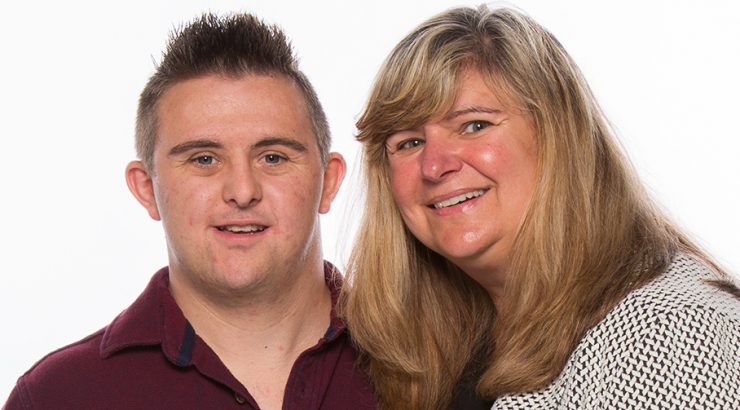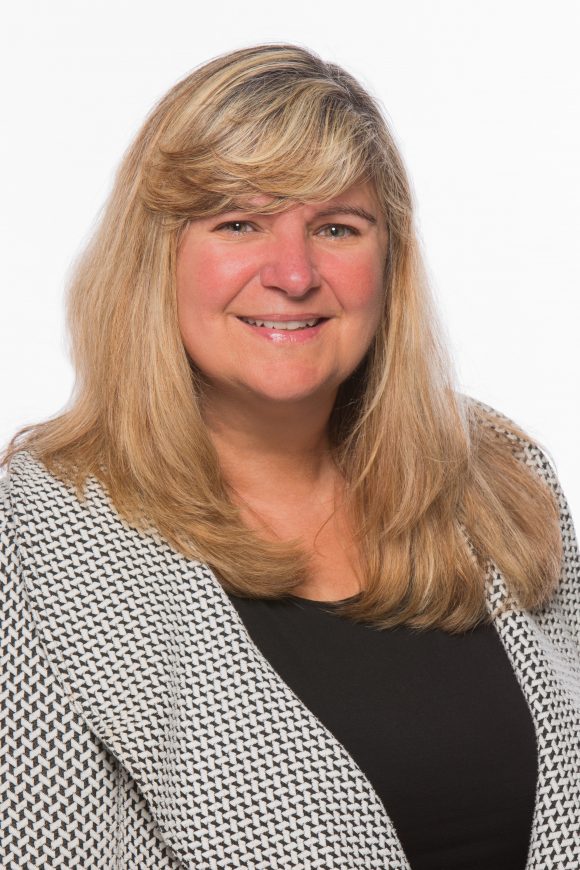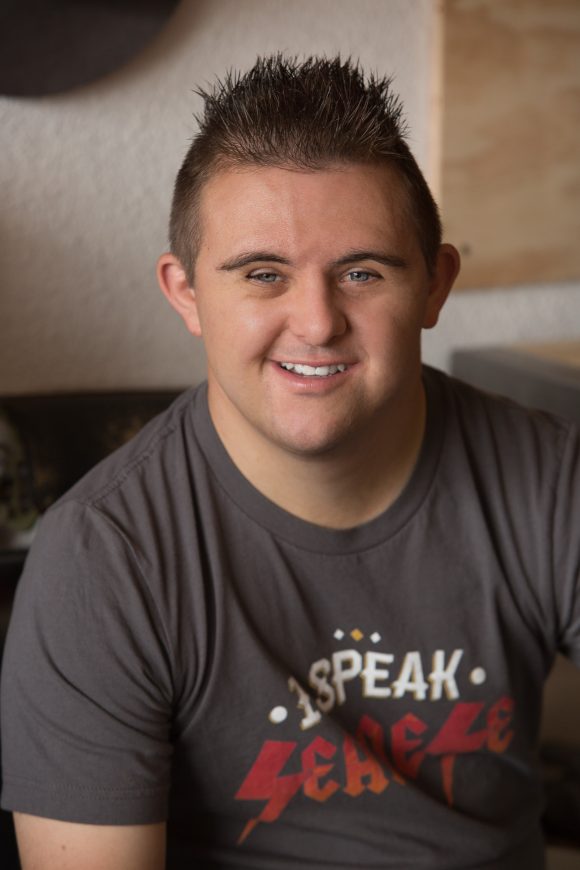
Interview on Accessibility with the McElwee’s Sean McElwee from "Born This Way," and his mom Sandra McElwee, share what they have learned about accessibility
August 18, 2017
Sean McElwee is 23 years old and happens to have Down syndrome. Sean thrived in inclusion in primary school and survived exclusion in secondary school. He is an entrepreneur, creating t-shirts with his funny sayings that can be seen at seanese.com. He also works at a trampoline park and enjoys public speaking, encouraging his audiences to never give up on their dreams. Living in his own apartment with supported living staff facilitating his independence, Sean loves making his own decisions and eating bean and cheese burritos every single day. Sean is a self-professed ladies man, a gifted athlete, and has dance moves that own the floor. Sean is a cast member for the Emmy Winning A&E Television show, “Born This Way.”
Sandra Assimotos McElwee is an advocate for unborn babies with Down syndrome and created one of the first websites for parents with a prenatal diagnosis. Author of three books, McElwee also contributed to the books, “Gifts: Mothers Reflect on How Children with Down Syndrome Enrich Our Lives,” and “You Will Dream New Dreams, Inspiring Personal Stories by Parents of Children with Disabilities.” Married over twenty-five years to Sean’s father, Rick, they enjoy traveling and participating in Sean’s activities. She supports Sean’s new business with the title, “Chief Dream Facilitator.” A medical sales professional, McElwee’s most important job is being Sean’s mother.
The Thompson Policy Institute (TPI) on Disability and Autism thought, what better way to learn about accessibility than to ask individuals who have worked through accessibility challenges, and paved the way for others. In this interview, Sean and Sandra McElwee share their thoughts on accessibility in education.
As a student who had both general and special education experiences, what stands out in your mind about the most important thing you learned in school?
My friends and listening and not arguing too much. I loved the sports the most and being the assistant to the varsity baseball team (in high school).
What would you like educators to know about teaching students who have disabilities?
That we learn but sometimes need more help and that If they act like they like us we feel better in class.
What advice would you give students with disabilities about friendship? Any tips on how to make friends?
Be nice to everyone even if you don’t like them you can be polite. And invite friends over to do things and go to football games with you and get ice cream together.
When a subject was hard (whether that be math, reading, writing, etc.) what was the most helpful thing a teacher could do to help you better understand the material?
Have another kid teach it to me because they know how to explain it and ask me questions when I raise my hand.
Was there something in your school career you wished would have happened differently? If so, what was it and how would you have liked it to go?
I wanted to be on tv since I was little and the drama teacher wouldn’t let me go to the next drama classes after drama 1. I wish I could have been in plays.

How were your experiences with the educational system as a mother who dealt with special and general education?
Elementary school was a collaborative success. Sean was the first student with any disability fully included in his neighborhood school. The teachers, school psychologist, and principal were open to trying new things and were so supportive of everything I suggested…they went with me to Inclusion conferences and by the time Sean was in 4th grade the whole school was transformed to an inclusive school. And then Intermediate school took it all and threw it in the trash. I ended up writing a book about the good and bad, “Who’s the Slow Learner? A Chronicle of Inclusion and Exclusion.” Because of the principal’s attitude, the teachers set Sean up for failure—and by the beginning of October they ended up with an 18 page IEP Compliance Complaint.
Sadly most of the special educators we worked with were predictive of Sean’s potential and always trying to tell me ‘why not’ and why he ‘couldn’t’ do things—sadly their expectations were so low.
How receptive was the educational system in listening to your wants, needs, fears, and desires for Sean’s educational programming?
Elementary school—amazing. Intermediate school—completely dismissed everything – Sean skipped 8th grade and high school was a tiny bit better but the teachers in the electives had never included students with disabilities before and while some were amazing, others had zero expectations of Sean. Some were so negative and limiting they couldn’t/wouldn’t hear any ideas and suggestions.
What can educators do to establish an effective partnership with parents of a child with a disability?
Begin by assuring the parents that you want what’s best for their child and acknowledge that nobody is a better expert about a child than their parents. When you start there, and build trust, then the rest should be easy.
Are there any types of programs/services would you like to see more often in today’s schools?
Programs and services are the problem. ‘Special’ education is the problem. There should just be ‘education’ and every student…no matter a diagnosis or not…should receive the supports and accommodations that they need to succeed. Differentiated instruction/universal design for learning (UDL) is critical for all students to succeed together. Districts should be in-servicing their seasoned teachers on how to teach in UDL – and every school should have special education supports and POSITIVE behavior management supports in place for ALL students.
Looking back, would you have done anything differently in relation to your advocacy for Sean’s schooling?
In high school, after Sean’s civil rights were violated over and over again, instead of filing a Civil Rights complaint I should have moved him to the high school down the road who had previously housed all of the segregated special day classes…because the elective teachers HAD included students with disabilities and were welcoming students with disabilities…but I felt this obligation to the 40 students coming behind Sean from his elementary school…and he was paving the way—I sacrificed his opportunity for those kids and really shouldn’t have.
Is there a piece of advice that you can provide to prospective educators?
Always realize Behavior Equals Communication and kids will do things that seem ‘bad,’ but if they look deeper there’s something being communicated…and punishment usually isn’t the answer. Take any courses in behavior management and attend conferences throughout your career—never stop learning.
Please share with us anything else you would like us to know.
Use evidence based practices—separate isn’t better for any students—not for students with special educational needs, not for typical students, not for gifted and talented students. We are all better together. Not one study ever done has shown that a student in a segregated environment performed better than students fully included.
Stay tuned for an upcoming interview in September where Sean McElwee shares his thoughts on his transition to work.
